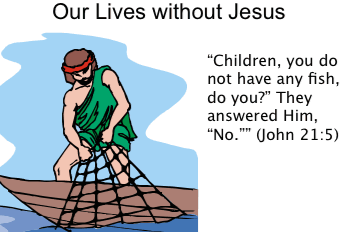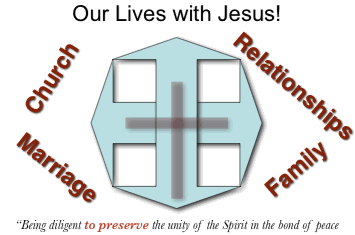 |
|
|
Intro: Problem of Disunity | A) Our Calling to Unity (Ephesians 4:1) | B) Our Oneness of the Body (Ephesians 4:2-3)
C) The Preservation of Unity (Ephesians 4:3) | | Bible Study Questions (Ephesians 4:1-3) D) The Doctrine of Unity (Ephesians 4:4-6) | One God & Father (Ephesians 4:6) | Bible Study Questions (Ephesians 4:4-6) |
D) The Doctrine of Unity (Ephesians 4:4-6)
One God and Father (Ephesians 4:6)
“There is one body and one Spirit, just as also you were called in one hope of your calling; one Lord, one faith, one baptism, one God and Father of all who is over all and through all and in all” (Ephesians 4:4-6).
Ephesians 4:4-6 lists 7 reasons for the body of Christ to live in harmony. This page focuses only on the last one. For more on the first six 'one' clauses click here.
• One God and Father
We do not have two fathers, only one. When I go to China, Singapore, Africa or Latin America or India and meet a fellow believer, we are brother and sister. We are one family. We were born into one family by the same Father. We share God’s image together through the Spirit and will forever share our Father’s riches in Christ.
Ephesians 4:6
Ephesians 4:6 no doubt closes with a very elaborate and difficult to understand set of complementary phrases describing God. Perhaps we need not say it is very difficult if we look only at its general meaning. God the Father is everywhere, all the time, fully in control and there is no place where God is not. When this verse is applied on a broader scale to all people, this statement against secularism becomes the strongest that could be made. Either one accepts or denies it. God is totally involved.
One God and Father
of all
who is over all and
through all and
in all (of you)
When we look specifically at what this set of phrases means, it can get rather complicated. This is not due to the vocabulary, though! These are some of the most simple vocabulary words possibly used. The early reader would be able to read if not understand what is said here.
Our problem compiles when we try to define each of the four phrases so that they do not conflict with the other phrases. Perhaps it is because we are tempted to clearly define them all as distinct from the others. They perhaps were written in such a way, but perhaps they were not.
‘God of all’ speaks of His creatorship. He might be speaking of the whole creation or more particular as the context suggests, the father of all believers. The apostle has strongly presented the case of unity in Ephesians chapter 3. It is this larger context that suggests Paul is speaking of only the believers here.
One might assume that God is just a mushy spirit figure until we read the next more refined description, “Who is over all.” He is not just generally present as in Eastern mysticism but fully in charge. He is present and constantly exerts His will to accomplish what we rightly assume to be His will. He is Sovereign. In this way, He finds enemies in our so-called modern society.
‘Through all’ refers to the way He awesomely exerts His will through His people. God doesn’t need us to agree with for Him to accomplish His will through us. Although working through us in a way that we concur with His efforts, He might at times have to work despite our purposes.
On a broader scale, we know this refers to how God works through all individuals to conduct His purposes. I suppose this thought makes the wicked hate God even more. The Lord is quite capable of working His good will even through the most calcitrant person. Just think of those who put Jesus to death. Through that one act, God established His kingdom forever.
This Man, delivered up by the predetermined plan and foreknowledge of God, you nailed to a cross by the hands of godless men and put Him to death. And God raised Him up again, putting an end to the agony of death, since it was impossible for Him to be held in its power (Acts 2:23-24).
Ephesians 4:6 is the strongest statement against secularism
The last phrase, “in all” perhaps is the easiest in the sense that He has already mentioned this here when Paul spoke of the Holy Spirit (Ephesians 1:13-14; 3:4). God is working in and through the church. We see the two views, the one view that believes it only refers to the body of Christ and the other view where it refers to all people. This same problem was evident in the early church for there was a slight difference in what the manuscripts said. If we simlified it, we would say that it would be "in all of you" or "in all." The former clarifies the object. The later leaves the interpretation a bit wider open (actually not because of the context).
But even this would not be too clear if we did not have the Greek. The Majority text (i.e. one family of Greek manuscripts) supports ‘in you all’ or ‘in us all’ (yes there is difference even here). Other texts or translations simply say “in all.”
“one God and Father of all who is over all and through all and in all.” Ephesians 4:6, NASB.
“eiv yeov kai pathr pantwn o epi pantwn kai dia pantwn kai en pasin hmin” Ephesians 4:6, Byz.
“one God and Father of all, who is over all and through all and in all.” Ephesians 4:6, NIV.
“one God and Father of all, who is over all, and with all, and in you all.” Ephesians 4:6, LO.
“and there is only one God and Father, who is over us all and in us all and living through us all.” Eph 4:6, NLT.
“One God and Father of all, who is above all, and through all, and in you all.” Ephesians 4:6, KJV.
It is possible that one has included the ‘you’ at the end to avoid any sense of universalism where all are saved. We cannot be certain whether Paul had originally written that or that it was later inserted to clarify the statement. We will with John Stott rest our case with the statement that in the end it does not matter because Paul has already fully clarified God’s glory over His church (Ephesians 3:20-21). We had just read about that. It is hard to think that he is now describing God’s presence inside every person, though we need to recognize God’s power over each person regardless of what one may believe. And in fact, if God is working through every believer in a very special way, such as giving spiritual gifts (next section), then He also works in a general way through everyone (Nebudadnezzar, Herod are just a few examples).
Truth or reality finds its source ultimately in God and the expression of Himself. Satan, however, uses lies, counter truths. He only can support his argument by darkness and division. Satan's unity, though, leads people in rebellion against God because it is built on a lie. People hate each other and are willing to work with one another just to seek their own advantage. They are, however, kept in darkness away from God's beautiful love. The more we understand the glory of Christ and the desperate darkness of the world of evil, we are touched by God’s saving hand upon our lives.
Application
Perhaps, in conclusion, we can think of one relationship that we have with another person that could be better. It might be your wife, child or neighbor. Humble yourself and confess your sin. You might have been rude, uncaring, said a thoughtless word, or just not really listening to them as if they had anything to say. Turn to the Lord and tell Him you are seeking His ways. You might not be able to change others but you want to be part of that mysterious glue that brings real peace to God’s family. Determine to love that person. Treasure them. Don’t be happy with superficial relationships. We are to watch over our relationships because they are so precious in the Lord’s sight. This is our opportunity to show God’s love. Preserver the unity of the Spirit.
The Net
I was trying to help illustrate what Paul was trying to say here in verses 1-6. Then in my devotions as I was reading John 21, I found an appropriate picture story.  So often in our lives we pretend we are doing our best on mending relationships, but we are doing it without Jesus. Jesus is there, but we live as if He is not there.
So often in our lives we pretend we are doing our best on mending relationships, but we are doing it without Jesus. Jesus is there, but we live as if He is not there.
Remember how Peter and a few disciples went fishing after the resurrection of Jesus? What did they catch? Nothing. All night they fished and all they had was empty fishing nets.
Then this person on shore early in the morning called out to them saying, “Children, you do not have any fish, do you?” They answered Him, “No.” (John 21:5). They did not know it was Jesus. Jesus knew they did not have any fish. The empty net is a picture of those who have been working hard doing the things the way that they think is best. The work hard. They might even work all night. But their net is empty.
This is a picture of our lives without Jesus. Our relationships are so stained with an unforgiving spirit, bitterness, trouble, self-pity, etc. There is no real love. We have empty nets and feel the effects in our lives. Jesus has a better way. Our church could be changed in a flash if we did things His way. Notice what Jesus told the disciples to do.
“And He said to them, “Cast the net on the right-hand side of the boat, and you will find a catch.” They cast therefore, and then they were not able to haul it in because of the great number of fish.”. It was only then that Peter recognized that it was the Lord.” (John 21:6, NASB).
 When we do things Jesus’ way, we are immediately stunned by what happens. All those things we thought were unsolvable are now gone!
When we do things Jesus’ way, we are immediately stunned by what happens. All those things we thought were unsolvable are now gone!
By focusing on these verses, it is easy to forget that we were earlier focusing on living peaceably with each other and preserving the unity of the Spirit. Ephesians 4:4-6 is the theological foundation for this concept of unity.
He chose to first exhort the believers to action (4:1-3) before he supported it with truth (4:4-6). The fact is, when we look at God and His work of redemption, we find great support for this concept of unity. Seven “ones” complete the proof of our call to unity. From now on, let us not compare ourselves with others but better understand God’s unique place for each of us and focus on supporting each other.
Next => Bible Study Questions on Ephesians 4:4-6
 Most of BFF articles such as this one is nicely formatted for printing. This article also has a Powerpoint. Check out the great number of articles on the BFF Biblical Training Library all at one low cost. |
Cross Trainers - The Father-son relationship.
Reflect on the father's authority in the home.
A father's responsibility to instruct his children (Dt 6).
A Case Study on Delinquent Youths - 2 Samuel 12-18
Read more exciting and practical articles on the Book of Ephesians.
Introduction to the Book of EphesiansPaul's Second Missonary Journey to Ephesus - Map Ephesians 1Ephesians 1:1-3 Every Spiritual BlessingEphesians 1:1-3 Every Spiritual Blessing Ephesians 2Ephesians 2:1-3 Our Need, His GraceEphesians 2:1-3, an Introduction Ephesians 3Ephesians 3:1-10 Growing in Our Commitment Ephesians 3:20-21 God's Unlimited Power |
Ephesians 4Ephesians 4:1-6 Preserving the Spirit's UnityIntroduction: Problems of Disunity Ephesians 4:11-16 The Purpose of TrainingEphesians 4:11-13: A) God's Word in the Church Ephesians 4:14 B) Responsibility 1. Deceit Ephesians 4:11-14 Chart: Equipping of the Saints Ephesians 5-6Ephesians 5:22,24 Wives be Subject to your Husband |
BFF Homepage | Top | Back | BFF Topics | Ephesians 4:4-6 Study questions
Biblical Foundations for Freedom
Paul J. Bucknell
NASB Bible used